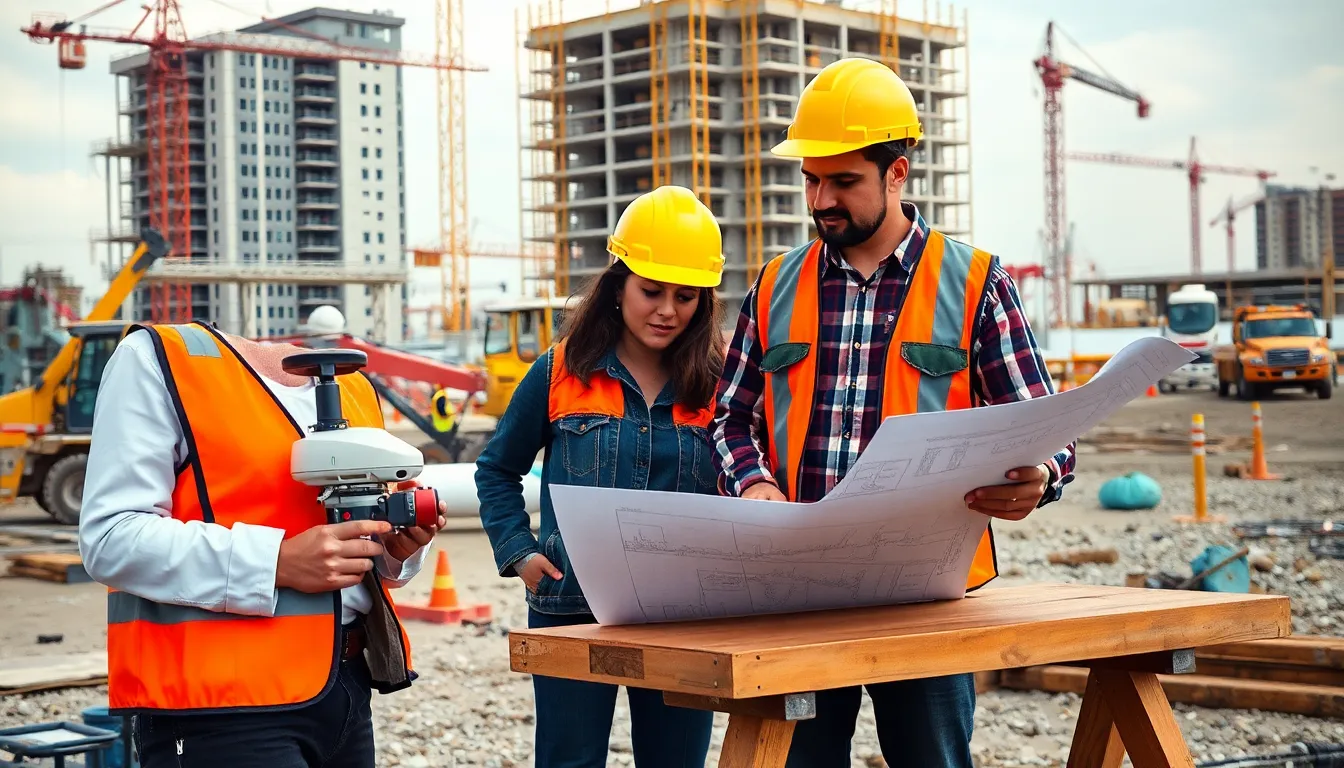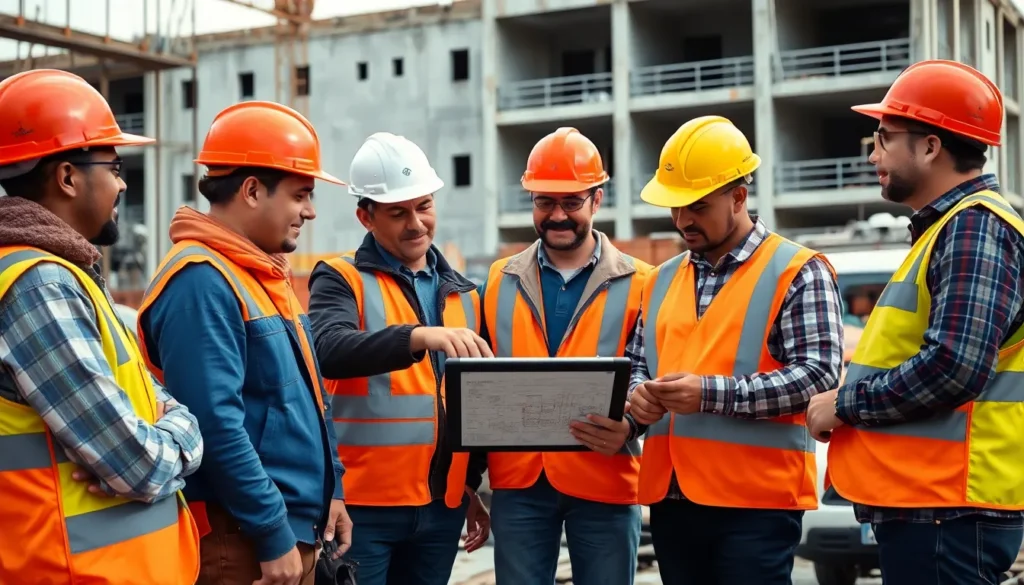Table of Contents
ToggleIn a world where robots can flip burgers and chatbots can hold a conversation, it’s no surprise that artificial intelligence is making its way into construction. Imagine a job site where your hard hat-wearing crew is complemented by smart machines that can predict project delays, optimize schedules, and even help avoid costly mistakes. Sounds like a construction worker’s dream, right?
Overview of AI in Construction
AI significantly transforms the construction industry through various applications and technologies. Smart machines and algorithms improve project efficiency by using data analysis and automation. Predictive analytics allows teams to foresee potential delays, addressing issues before they escalate.
Robotics play a critical role in tasks like bricklaying and excavation, reducing labor costs and enhancing precision. Drones increase site safety by offering aerial surveys for monitoring progress and assessing risks. Machine learning algorithms optimize project schedules, ensuring teams use resources effectively.
Automation of repetitive tasks frees up construction workers for more complex assignments. Furthermore, AI systems assist in quality control by identifying design flaws and material defects early. With real-time data, stakeholders make informed decisions that streamline the construction process.
AI’s impact extends to sustainability. Energy-efficient designs emerge from AI analysis, reducing environmental footprints. Additionally, the use of AI in predictive maintenance leads to less downtime and better equipment lifespan.
Current adoption rates show promising growth in AI technologies, with an estimated 40 percent of construction firms utilizing them by 2025. As these advancements continue, AI’s role in enhancing safety and productivity in construction becomes increasingly essential.
Benefits of AI in Construction

AI technologies bring several advantages to the construction industry. Significant improvements are evident in workflows, project management, and safety measures.
Increased Efficiency
AI streamlines construction processes, enabling faster project completion. By leveraging predictive analytics, teams anticipate delays and adjust timelines proactively. Automation of repetitive tasks allows workers to concentrate on more complex jobs. Machine learning algorithms analyze data to optimize schedules, thus enhancing resource allocation. Drones provide quick aerial surveys, reducing time spent on manual site inspections. These technologies collectively create more efficient job sites, leading to higher productivity levels and smoother operations.
Cost Reduction
Cost savings emerge as major advantages of using AI in construction. Predictive maintenance minimizes equipment downtime, lowering repair costs and extending the lifespan of machinery. AI-driven insights allow firms to identify potential risks before they escalate into costly issues. Optimized project schedules and resource management further contribute to reduced waste. Robotics, like automated bricklaying, significantly cut labor costs while maintaining quality. Firms adopting AI technologies can expect substantial financial benefits, with up to 30% lower project costs reported in various applications.
Challenges of Implementing AI
Implementing AI in construction presents various challenges that firms must address effectively.
Data Privacy Concerns
Data privacy concerns surface when collecting and analyzing sensitive information. Construction firms manage personal data related to employees and clients, which necessitates strict adherence to regulations. Mismanagement of this information can lead to breaches that damage trust and incur penalties. Companies must invest in robust cybersecurity measures to protect against unauthorized access. Ensuring compliance with regulations like GDPR and CCPA is vital to sustain a reputation in the industry. Maintaining transparency with stakeholders regarding data usage fosters confidence and collaboration.
Integration with Existing Systems
Integrating AI with existing systems often proves complex. Many construction companies use legacy software that may not support advanced AI technologies. Often, integrating new solutions requires significant overhauls or additional investments. Teams frequently encounter compatibility issues between AI tools and current workflows, leading to potential disruptions. Proper training for the workforce becomes essential to maximize the benefits of AI while minimizing resistance. Establishing clear communication channels ensures everyone is aligned throughout the transition process.
Innovative Applications of AI
AI reshapes construction through innovative applications that enhance efficiency and safety. Advancements in automation and predictive analytics play significant roles in project management and maintenance.
Project Management Automation
Automation improves project management by optimizing scheduling and resource allocation. Smart systems analyze historical data, allowing teams to anticipate delays and adjust timelines effectively. Tasks such as budget tracking, task assignments, and progress reporting become streamlined, reducing administrative overhead. AI algorithms can prioritize tasks based on critical paths, ensuring that teams focus on high-impact activities first. With automation handling repetitive responsibilities, human workers dedicate more time to strategic planning and complex problem-solving. As a result, project completion times decrease significantly, often leading to savings of up to 30% in overall costs.
Predictive Maintenance
Predictive maintenance utilizes AI to enhance equipment reliability. By analyzing performance data, systems can identify patterns that indicate potential failures before they occur. This proactive approach reduces equipment downtime, enabling continuous operations. Conducting maintenance only when necessary ensures optimal machinery performance and longevity. Regular insights generated by AI tools allow for timely interventions, which minimizes the likelihood of costly breakdowns. Many organizations report increased equipment lifespan, contributing to significant cost savings in repair and replacement expenses. Overall, implementing predictive maintenance strategies not only improves operational efficiency, it fosters a safer work environment as well.
Future Trends of AI in Construction
AI in construction is set to evolve significantly, with various innovations on the horizon. Emerging technologies will create more intelligent machines that support laborers, enhancing project management and operational efficiency. Predictive analytics, for instance, enhances decision-making by forecasting project risks and timelines.
Machines will refine tasks in design and logistics, allowing more seamless collaboration among teams. Robotics will gain greater adoption for roles such as masonry and heavy lifting, which can reduce accident rates and improve productivity. The integration of drones is also expected to expand, providing real-time data for site assessments and safety monitoring.
Cloud-based AI platforms are likely to dominate in the coming years. These platforms facilitate data sharing and project updates, enhancing communication across teams and stakeholders. As construction projects grow in complexity, these agile solutions will become essential for managing resources and budgets efficiently.
Moreover, sustainability initiatives will benefit from AI innovations as companies strive to meet increasing regulatory demands. AI technology will optimize energy consumption in buildings, promoting eco-friendly practices and reducing operational costs.
Market trends indicate a strong growth trajectory for AI technologies in construction, with 40 percent of firms expected to implement such solutions by 2025. The anticipated reduction in project costs, reported at up to 30 percent, will further motivate firms to adopt these advancements. Emphasis on cybersecurity will also rise, as protecting sensitive data becomes pivotal in maintaining trust and adhering to regulations. Businesses must prioritize training their workforce and developing strategies to integrate AI into existing processes while overcoming potential resistance.
The integration of AI in construction marks a significant evolution in how projects are managed and executed. With its ability to enhance efficiency and safety while reducing costs, AI is becoming indispensable in the industry. As firms embrace these technologies they can expect transformative benefits that drive productivity and innovation.
However the journey toward full AI adoption requires careful navigation of challenges such as data privacy and system integration. By prioritizing workforce training and robust cybersecurity measures companies can create a solid foundation for success.
The future of construction is undeniably intertwined with AI advancements promising a smarter safer and more sustainable industry. As these technologies continue to evolve the potential for improved project outcomes becomes increasingly attainable.







